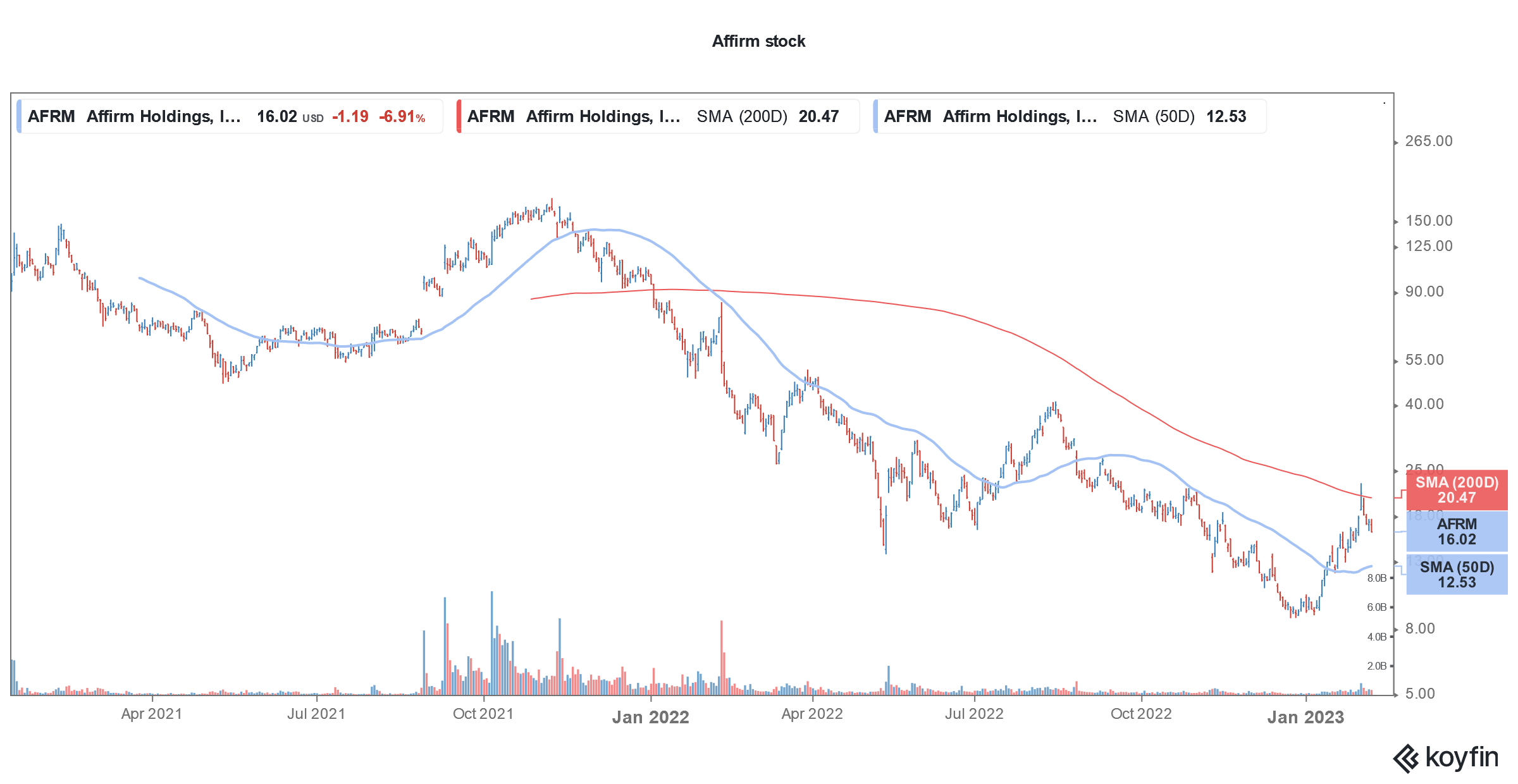Affirm Stock Crashes After Earnings Miss and Guidance Cut
Please note that we are not authorised to provide any investment advice. The content on this page is for information purposes only.
Affirm (NYSE: AFRM) stock is trading sharply lower in US premarkets today after the company missed both topline and bottomline estimates for the second quarter of the fiscal year 2023 and also slashed its guidance.
The company also announced that it is cutting 19% of its workforce and joined other tech companies which have announced mass layoffs in a bid to lower costs.
Affirm reported revenues of $400 million in the quarter. While sales were higher than the $361 million that it reported in the corresponding quarter last year, they fell short of the $416 million that analysts were expecting.
Affirm missed revenue estimates in the fiscal second quarter
In the shareholder letter, Affirm CEO Max Levchin said, “A key operational misstep contributing to these results is that we began increasing prices for our merchants and consumers later in the year than we should have, and this process has taken us longer than we anticipated.”
The company’s GMV (gross merchandise value) rose to a new record of $5.7 billion in the quarter as compared to $4.5 billion in the corresponding quarter in the previous year. The metric however trailed analysts’ estimates. The company’s GMV and revenues were also lower than what it had forecast. Its adjusted operating income was however better than what the company expected.
Its per-share loss of $1.10 was meanwhile ahead of the 98 cents that analysts were expecting.
Affirm lays off around 500 people
Affirm has laid off 19% of its workforce which would affect around 500 people. Commenting on the layoffs, Levchin said, “we have hired a larger team that we can sustainably support in today’s economic reality.”
In his message to employees, Levchin said, “Growing rapidly over the last few years, and especially through the pandemic, we consciously hired ahead of the revenue required to support the size of the team.”
He added, “This was a deliberate decision: the product opportunities in front of Affirm were too compelling to ignore, and the revenue growth we posted gave us confidence in this strategy.”
Like many other tech executives, he took responsibility for the situation and said, “The root cause of where we are today is that I acted too slowly as these macroeconomic changes unfolded.”
The company now sees its headcount at similar levels in the near foreseeable future.
Levchin blames Fed’s rate hikes for the layoffs
Levchin said that “everything changed in mid-2022,” and pointed to Fed’s rate hikes. The Fed raised rates to 4.25%-4.50% last year after seven straight hikes since March. The US central bank raised rates by another 25 basis points this month.
Levchin said that the Fed’s rate hikes not only dampened consumer demand but also raised the cost of funds for Affirm.
He said that the cost cuts are necessary for the company as it strives to become profitable later this fiscal year based on adjusted operating income.
He also pointed to the massive market opportunity and said that Affirm currently accounts for only 0.25% of the US retail sales. Levchin was also optimistic about the credit profile of its customers and said that its delinquencies fell sequentially in the quarter while the broader industry has witnessed a rise in bad loans amid the economic turmoil.
Affirm lowered guidance
Affirm meanwhile lowered its full-year guidance and now expects GMV between $19 billion-$20 billion in the fiscal year. Its previous guidance was GMV between $20.5-$21.5 billion.
Similarly, it lowered its full-year revenue projection from $1.6 billion-$1.675 billion, to $1.475 billion-$1.550 billion.
For the current fiscal quarter, the company forecast GMV between $4.4 billion-$4.5 billion, which trailed analysts’ estimate of almost $5.3 billion. The company’s revenue guidance of $360 million-$380 million also fell well short of the $418 million that analysts were expecting.
AFRM shuts crypto business
Affirm also shut down its crypto business as it tries to reduce its cost base. In his letter, Levchin said, “Concurrent with reducing our workforce, we are sunsetting several initiatives, such as Affirm Crypto.”
In 2021, the industry saw a lot of action as Block acquired Afterpay while Apple was rumored to be entering the BNPL industry.
Affirm also entered a partnership with Amazon to bring its BNPL solutions to the company’s e-commerce platform.
The BNPL industry faces multiple headwinds
Fast forward to 2023, and things have turned upside down for the BNPL industry as is visible in Affirm’s sagging stock price. Meanwhile, the BNPL industry faces several headwinds amid the current macro environment.
Firstly, the demand has slowed down amid falling sales of discretionary products. The rising cost of funds is not helping matters neither is the general deterioration in the credit profile of borrowers. The competition is also rising as Apple is reportedly in the final stages of launching its BNPL product.
Regulators also want greater scrutiny of BNPL companies like Affirm.
Analyst predicts Affirm would go bankrupt
Earlier this year, Trent Masters, fund manager at Alphinity Investment Management predicted that Affirm would not survive 2023. He said, “When it comes to BNPL, it really is that tip of the spear where [their customers] were getting filled with fairly free capital through all the stimulus programs.”
He added, “That was the kind of the business models that I’m talking about where the free and infinite capital not just underpinned the value and the growth, but it’s actually really essential to potentially the survival of those businesses.”
Masters listed Carvana as the other business which he believes would not survive beyond 2023.
Both Carvana and Affirm crashed in 2022 but have rebounded from their all-time lows. Affirm meanwhile looks set to crash yet again in today’s price action after disappointing earnings for yet another quarter.






